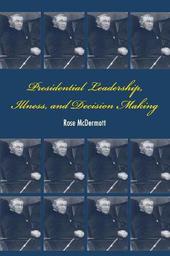
|
Presidential Leadership, Illness, and Decision Making
Paperback / softback
Main Details
| Title |
Presidential Leadership, Illness, and Decision Making
|
| Authors and Contributors |
By (author) Rose McDermott
|
| Physical Properties |
| Format:Paperback / softback | | Pages:344 | | Dimensions(mm): Height 228,Width 151 |
|
| ISBN/Barcode |
9780521709248
|
| Classifications | Dewey:352.236 352.23/6 |
|---|
| Audience | | Professional & Vocational | |
|---|
| Illustrations |
Worked examples or Exercises
|
|
Publishing Details |
| Publisher |
Cambridge University Press
|
| Imprint |
Cambridge University Press
|
| Publication Date |
3 December 2007 |
| Publication Country |
United Kingdom
|
Description
Examines the impact of medical and psychological illness on foreign policy decision making. Illness provides specific, predictable, and recognizable shifts in attention, time perspective, cognitive capacity, judgment, and emotion, which systematically affect impaired leaders. In particular, this book discusses the ways in which processes related to aging, physical and psychological illness, and addiction influence decision making. This book provides detailed analysis of four cases among the American presidency. Woodrow Wilson's October 1919 stroke affected his behavior during the Senate fight over ratifying the League of Nations. Franklin Roosevelt's severe coronary disease influenced his decisions concerning the conduct of war in the Pacific from 1943-1945 in particular. John Kennedy's illnesses and treatments altered his behavior at the 1961 Vienna conference with Soviet Premier Khrushchev. And Nixon's psychological impairments biased his decisions regarding the covert bombing of Cambodia in 1969-1970.
Author Biography
Rose McDermott is Associate Professor of Political Science at the University of California, Santa Barbara. Professor McDermott's main area of research revolves around political psychology in international relations. She is the author of Risk Taking in International Relations: Prospect Theory in American Foreign Policy (1998) and Political Psychology in International Relations (2004). Professor McDermott has held fellowships at the John M. Olin Institute for Strategic Studies and the Women and Public Policy Program, both at Harvard University.
Reviews"McDermott has written a significant, innovative study that adds greatly to the literature on political psychology and presidential leadership....The chapter on how JF's use of steroids for treatment of Addison's disease, and of narcotics and amphetamines, influenced his behavior with Khrushchev during the 1961 Vienna Conference is especially riveting. Finally, the implications of McDermott's analysis are brought to bear on the Twenty-Fifth Amendment, with some final thoughts on presidential care....Essential." E. C. Dreyer, University of TulsaChoice
|